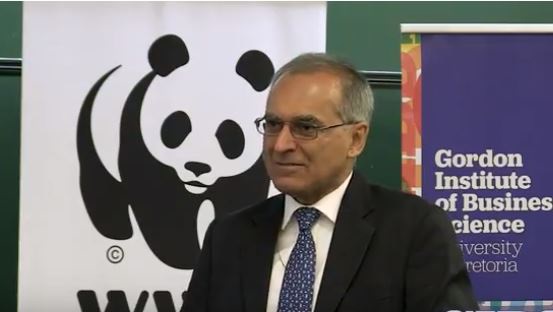
Environmental economist and President of the World Wide Fund for Nature Pavan Sukhdev believes there should be a fundamental reevaluation of the role of the corporation in society, and that it is the only entity powerful enough to effect global change.
Addressing a recent GIBS forum, Sukhdev said, “I believe the corporation is the most important institution of our time, it is the mainstay and the engine of the economy.”
However, “corporations have the responsibility to run the economy, and we are running it to ruin,” he said.
The need for change
The private sector’s unwavering focus on privitising profits and externalising costs had resulted in hundreds of millions of dollars in undisclosed third party costs, including social harm and irreversible damage to the environment and climate.
These negative externalities and hidden costs of commercial activities are not accounted for.
At present, “the private sector is free to do business without paying attention to externalities.
It is the biggest free lunch. But we all pay, and are suffering in terms of health and the environment.”
Greenhouse gasses, air pollution, water extraction and natural resource use are pushing the planetary boundaries.
Sectors that are the largest culprits include coal power generation, cattle, wheat and rice farming.
“We are a part of nature, but we don’t seem to recognise that fundamental reality. What we are seeing are the negative effects of that thinking,” Sukhdev said.
Corporations largely consider themselves as vehicles to create value for shareholders and not as entities with a social purpose. “Negative externalities are the third party impact of doing business as usual.”
Any concept that suggests a global transition to a green economy or a circular economy is meaningless unless it focuses on delivery through the engine of the economy that is the corporation, Sukhdev said.
“Unless we can change the private corporation, we are just talking to ourselves.”
Corporation 2020
Sukhdev explained his vision for a new type of business model: Corporation 2020, which places purpose before profits.
Tomorrow’s corporation would be a producer of not just profits for shareholders, but value for all stakeholders.
It would aim to be a creator of positive as opposed to negative externalities.
Between 1820 and 1920, the concept of the corporation as an artificial being or entity was created, and the primary purpose of the corporation as a machine to generate returns for shareholders was established.
Corporations were concerned with the pursuit of size; involved in active lobbying; leveraged their organisations without limit; and engaged in advertising without ethics.
“But there is nothing that prevents the corporation from doing good,” Sukhdev said.
By disclosing and managing externalities, the private sector would move from a focus on shareholder performance to broader stakeholder performance.
An integrated profit and loss, and not just an emphasis on shareholder returns would look at the “big picture”.
“If we follow this thinking, we will reach Corporation 2020, which is a completely different business model where most companies would be created with social purpose,” Sukhdev explained.
Corporation 2020 would be:
• Created for social purpose
• Create collateral benefits by choice
• Create human capital
• Create social capital (the corporation as community)
• Concern itself with the conservation of natural capital
“All of these effects can be calculated,” Sukhdev said, and are not just assets in private ownership of the company, but rather assets in public ownership of society.”
“Corporation 2020 is therefore focused on creating private profits, as well as public wealth.”
Through the creation of natural benefits by choice, private companies would create shareholder value while improving their brand value and reputation. It could also result in opportunities for innovation.
“This is what will ensure that nature’s value is recognised, valued and conserved,” Sukhdev said.
How to effect change
The implementation of this ‘green accounting,’ integrating negative externalities, would need to be introduced first as guidelines, then as standards in order to effect meaningful change.
Change would need to come through a combination of incentives and regulation, as not enough companies would be willing to change voluntarily.
“Today we have leadership, but what we need is followership,” Sukhdev explained.
“The number of companies willing to move in this direction is 5%, but the other 95% who do not see it as their responsibility are problematic.”
Integrating negative externalities would do for corporate responsibility what the balance sheet and profit and loss statement had done for corporate accountability, he explained.
However, current realities meant change needed to be implemented urgently: “We have to change the environment of the corporation – policies, prices and institutions – in order to change the corporation into the creature we seek, rather than the creature we have.”
The power of the private sector could be balanced by a stronger civil society.
“It is a global change and needs to be a global effort. Success has to come from a constellation of actors, including regulators, the accountancy profession and civil society, who all have to move in sync for it to work,” Sukhdev concluded.
• City Press is a media partner of the Gibs forums




 Publications
Publications
 Partners
Partners








